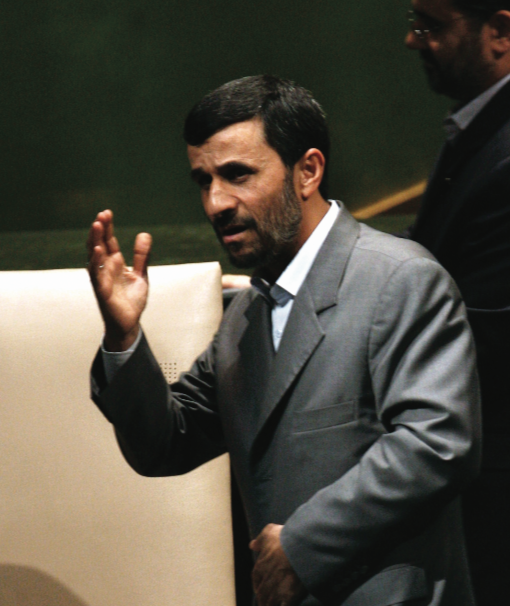If you are keeping score at home, September was a bad month for the “Axis of Evil,” especially for its junior member in Damascus. In the middle of the month, Iranian president Mahmoud Ahmadinejad came to New York to address the UN General Assembly and was invited to Columbia University, one of the US’s most important institutions of higher learning.
Once led by Five-Star General Dwight D. Eisenhower after he had helped the Allies win WWII as supreme commander of the Allied Expeditionary Force and before he became the thirty-fourth president of the United States, Columbia of late has acquired something of a reputation as a hotbed of campus anti-Americanism. After all, this is the tenured perch from where Edward Said had famously explained how Western imperialism was responsible for everything that had gone wrong with the Middle East. Current Columbia University president, Lee Bollinger, turned the Orientalism doctrine on its head by calling the Islamic Republic of Iran to account for its policies, foreign and domestic.
If many observers thought it rude to treat a guest with so little hospitality, the Islamic Republic of Iran has extended few Oriental courtesies this last quarter century to foreign academics, foreign journalists and, of course, foreign embassy staff. However, Ahmadinejad had no reason to fear that Ivy league undergraduates were capable of the same revolutionary violence his former student colleagues had shown to the US diplomats and embassy staffers they took hostage for 444 days back in ‘79, but the Iranian leader was certainly flummoxed when the students booed and jeered after he claimed there was no homosexuality in Iran. No doubt this will come as news to aficionados of Persian and Abbasid poetry and prose.
But the big news was the hazily, albeit avidly, reported “Operation Orchard,” the Israeli raid on Syria September 6. It is quite possible that no one will know precisely what happened for decades, especially if it was, as many suspect, an attack on a nuclear facility housing North Korean wares. Nuclear issues are notoriously sensitive subjects for all involved. And yet if the events at Deir el-Zor remain a mystery, certain other things have become clear.
First of all, among members of the international community only North Korea made any noise about the raid. The Israeli incursion, said one North Korean foreign ministry official, was “little short of wantonly violating the sovereignty of Syria and seriously harassing the regional peace and security.” This protest, amidst the silence of the Arab states and all of Europe, has buttressed the claims of some analysts that the Syrians were indeed housing North Korean goods. In other words, Bush’s speech describing the “Axis of Evil” in terms that have been routinely derided by more “sober” observers of the international scene is much more than just the cartoonish imagination of a White House speechwriter.
For Tehran, the Deir el-Zor raid means that the Americans and Israelis have a very sound solution to the IRI’s nuclear program once it becomes clear that the diplomatic option is no longer workable. France’s new Foreign Minister Bernard Kouchner made waves when he said the world must prepare for the worst with Iran, which, in the estimation of the new Paris government, means war.
Washington clearly has no taste for war with Iran as it is still trying to make Iraq workable, and yet Deir el-Zor should give Tehran pause. Insofar as the ostensible Iranian response to an attack on their nuclear program is not massive troop movements but terror operations against US interests and allies, that no longer seems to be a daunting concern for the Americans.
Moreover, if most the foreign policy advisers for the 2008 Presidential hopefuls take it for granted that that Bush will pass the Iran file on to the next administration, this is a useful reminder that finally it will depend on the predisposition of the commander-in-chief. Bush does not lead according to poll numbers and it is not obvious why the man who staked his legacy on bringing democracy to the Middle East would leave intact a nuclear program that would change the balance of the region to the benefit of an ideological and millenarian Islamist regime.
As for Damascus, while regime functionaries and flacks have been crowing about how badly the US needs Syria, it looks like it is going to be a very cold winter in the beating heart of Arabism. Since Syria shows little inclination in changing its own status quo, it perhaps does not understand that, once again, the earth has shifted under its clay feet.
LEE SMITH is a Hudson Institute visiting fellow and reporter on Middle East affairs.









